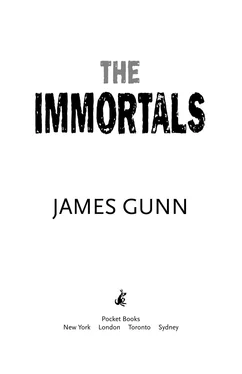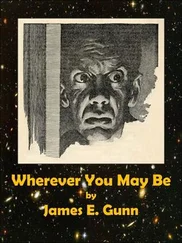The dean didn’t know Harry. He sat behind the rolltop desk in his white jacket and studied Harry’s record cast up on the frosted glass insert. He was good at reading as if he were simply glancing down, but you couldn’t deceive a man who had studied like that for ten years in this Center alone.
The dean’s black hair was thinning. He was almost eighty years old now, but he didn’t look it. He came of good stock, and he had had the best of medical care. He was good for another twenty years, Harry estimated, without longevity shots. By that time, surely, with his position and his accomplishments, he would be voted a reprieve.
Once, when a bomb had exploded in the power room, some of the doctors had whispered in the safe darkness that Mock’s youthful appearance had a more reasonable explanation than heredity, but they were wrong. Harry had searched the immortality lists, and Mock’s name wasn’t on them.
Mock looked up quickly and caught Harry staring at him. Harry glanced away, but not before he had seen in Mock’s eyes a look of—what?—fright? Desperation?
Harry couldn’t understand it. The raid had been daring, this close to the Center walls, but nothing new. There had been raids before; there would be raids again. Any time there is something valuable, lawless men will try to steal it. In Harry’s day it happened to be medicine.
Mock said abruptly, “Then you saw the man? You could recognize him if you saw him again, or if you had a good solidograph?”
“Yes, sir,” Harry said. Why was Mock making such a production out of it? He had already been over this with the head resident and the chief of the company police.
“Do you know Governor Weaver?” Mock asked.
“An Immortal?” Mock might as well have asked if he knew God.
“No, no,” Mock said impatiently. “Do you know where he lives?”
“In the governor’s mansion. Forty miles from here, almost due west.”
“Yes, yes,” Mock said. “You’re going to carry a message to him, a message. The shipment has been hijacked. Hijacked.” Mock had developed a nervous habit of repeating words. Harry had to listen intently to keep from being distracted. “It will be a week before another shipment is ready, a week. How we will get it to him I don’t know. I don’t know.” The last statement was muttered to himself.
Harry tried to make sense out of it. Carry a message to the governor? “Why don’t you call him?” he said, unthinking.
But the question only roused Mock out of his introspection. “The underground cables are cut. Cut. No use repairing them. Repairmen get shot. And even if they’re fixed, they’re only cut again the next night. Radio and television are jammed. Get ready. You’ll have to hurry to get out the southwest gate before curfew.”
“A pass will get me through,” Harry said, uncomprehending. Was Mock going insane?
“Didn’t I tell you? Tell you?” Mock passed the back of his hand across his forehead as if to clear away cobwebs. “You’re going alone, on foot, dressed as a citizen. A convoy would be cut to pieces. To pieces. We’ve tried. We’ve been out of touch with the governor for three weeks. Three weeks! He must be getting impatient. Never make the governor impatient. It isn’t healthy.”
For the first time Harry really understood what the dean was asking him to do. The governor! He had it in his power to cut half a lifetime off Harry’s personal quest for immortality. “But my residency—”
Mock looked wise. “The governor can do you more good than a dozen boards. More good.”
Harry caught his lower lip between his teeth and counted off on his fingers. “I’ll need nose filters, a small medical kit, a gun—”
Mock was shaking his head. “None of those. Out of character. If you reach the governor’s mansion, it will be because you pass as a citizen, not because you defend yourself well or heal up your wounds afterward. And a day or two without filters won’t reduce your life expectancy appreciably. Well, Doctor? Will you get through?”
“As I hope for immortality!” Harry said fervently.
“Good, good. One more thing. You’ll take along with you the people you saw in the anteroom. The boy’s name is Christopher; the old man calls himself Pearce. He’s some kind of neighborhood leech. The governor has asked for him.”
“A leech?” Harry said incredulously.
Mock shrugged. His expression said that he considered the exclamation impertinent, but Harry could not restrain himself, and he said, “If we made an example of a few of these quacks—”
“The clinics would be more crowded than they are now. Now. They serve a good purpose. Besides, what can we do? He doesn’t claim to be a physician. He calls himself a healer. He doesn’t drug, operate, advise, or manipulate. Sick people come to him and he touches them. Touches them. Is that practicing medicine?”
Harry shook his head.
“What if the sick people claim to be helped? Pearce claims nothing. Nothing. He charges nothing. Nothing. If the sick people are grateful, if they want to give him something, who is to stop them?”
Harry sighed. “I’ll have to sleep. They’ll get away.”
Mock jeered, “A feeble old man and a boy?”
“The girl’s lively enough.”
“Marna?” Mock reached into a drawer and brought out a hinged silver circle. He tossed it to Harry. Harry caught it and looked at it.
“It’s a bracelet. Put it on.”
It looked like nothing more than a bracelet. Harry shrugged, slipped it over his wrist, and clamped it shut. For a moment it seemed too big, and then it tightened. His wrist tingled where the bracelet touched him.
“It’s tuned to the one on the girl’s wrist. Tuned. When the girl moves away from you, her wrist will tingle. The farther she goes, the more it will hurt. After a little she will come back. I’d put bracelets on the boy and the old man, but the bracelets only work in pairs. Pairs. If someone tries to remove the bracelet forcibly, the girl will die. Die. It links itself to the nervous system. The governor has the only key.”
Harry stared at Mock. “What about mine?”
“The same. For you it’s a warning device.”
Harry took a deep breath and looked down at his wrist. The silver gleamed now like a snake’s flat eyes.
“Why didn’t you have one on the medic?”
“We did. We had to amputate his arm to get it off.” Mock turned to his desk and started the microfilmed reports flipping past the window again. In a moment he looked up and seemed startled that Harry had not moved. “Still here? Get started. Wasted too much time now if you’re going to beat curfew.”
Harry turned and started toward the door through which he had come.
“Watch out for ghouls,” Dean Mock called after him. “And mind the headhunters.”
* * *
By the time they reached the southwest gate, Harry had evolved a method of progress for his little group that was mutually unsatisfactory.
“Hurry up,” he would say. “There’s only a few minutes left before curfew.”
The girl would look at him and look away. Pearce, already moving more rapidly than Harry had expected, would say, “Patience. We’ll get there.”
None of them would speed up. Harry would walk ahead rapidly, outdistancing the others. His wrist would begin to tingle, then to smart, to burn, and to hurt. The farther he left Marna behind, the worse his pain grew. Only the thought that her wrist felt just as bad sustained him.
After a little the pain would begin to ebb. He knew then, without looking, that she had broken. When he would turn, she would be twenty feet behind him, no closer, willing to accept that much pain to keep from coming nearer to him.
Then he would have to stop and wait for the old man. Once she walked on past, but after a little she could stand the pain no more, and she returned. After that she stopped when he did.
Читать дальше












